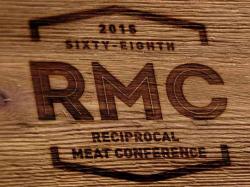RMC Symposium To Address Growing Social Interest In How Meat Is Produced
March 27, 2015 | 3 min to read

Champaign IL – The American Meat Science Association (AMSA) is pleased to announce that, Drs. Ted Schroeder, Gary Smith, and Eric Berg, will be the featured speakers in the AMSA 68th Reciprocal Meat Conference (RMC) Implications of Growing Social Interest in How Meat is Produced in the U.S. symposium, on Monday, June 15. This session is designed to elevate awareness and initiate focused discussion on how RMC attendees can most effectively understand and respond to growing public interest in how meat is produced, processed, and marketed within the U.S.
Economic Implications of Growing Social Interest in How Meat is Produced in the U.S.: Amazing strides have been made in increasing production efficiency and providing low cost food products to consumers. However, this does not always fully align with all consumer preferences. In an affluent society, with low cost food, consumers develop perceptions and preferences regarding food products that can create conflict and uncertainty. Contested social issues, food labeling, and food regulation debates result. Policy tends to mimic public sentiment in a crude and imperfect way. However, policies must be made with consistent careful assessment of economic and social consequences. Join us as Ted Schroeder, Ph.D., Professor from Kansas State University discusses what this means for the U.S. meat industry and the challenge that these different supply chains might have.
Pre-Harvest (Animal Production) Implications Of Growing Social Interest in How Meat Is Produced in the U.S.: Gary Smith, Ph.D., visiting Professor at Texas A&M University and Colorado State University will discuss with attendees the growing U.S. and global public interest in where, how, and by whom animals that ultimately yield or generate meat, poultry, eggs and/or milk are raised and sustained during their productive lives. Historically, farmers/ranchers raised or produced whichever meat-animals they had, under whatever circumstances they could control, and sold them to largely non-discriminating buyers. Now, producers must make decisions regarding which, if any, of current prevalent desires among potential customers/consumers is a whim, a fad or a likely-to-continue trend plus how much of such a product should be offered.
Post Harvest (Meat Science) Implications of Growing Social Interest in How Meat is Produced in the U.S.: There is a growing separation in knowledge between modern agriculture producers and food consumers. Part of this separation is driven from the fact that most food consumers in the U.S. do not live in rural areas or have an agricultural background. With the American population moving farther away from agriculture, basic education about agriculture is lacking for most Americans. Major issues affecting production agriculture and future sustainability are becoming mainstream topics of discussion. It is important that consumers know the role agriculture has in their everyday lives. Dr. Eric Berg, Professor at North Dakota State University will present tips for engaging consumers (aka foodies) in conversation about modern meat production, processing, consumption, and nutritional value. He will draw upon data collected from over 6,500 attendees of the NDSU BBQ Boot Camp.
The AMSA 68th Reciprocal Meat Conference (RMC) will be held June 14-17, 2015 at University of Nebraska-Lincoln, in Lincoln, Neb. For more information regarding the AMSA 68th RMC please visit: http://www.meatscience.org/rmc or contact Deidrea Mabry 1-800-517-AMSA ext. 12.
AMSA fosters community and professional development among individuals who create and apply science to efficiently provide safe and high quality meat (defined as red meat (beef, pork and lamb), poultry, fish/seafood and meat from other managed species).
Source: American Meat Science Association (AMSA)
